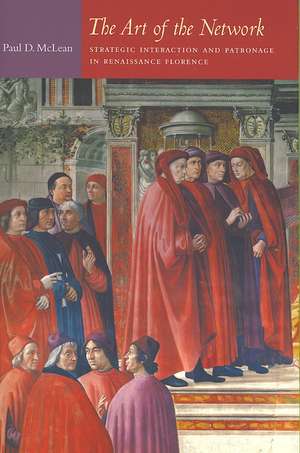The Art of the Network – Strategic Interaction and Patronage in Renaissance Florence: Politics, History, and Culture
Autor Paul D. Mcleanen Limba Engleză Paperback – 6 dec 2007
Din seria Politics, History, and Culture
-
 Preț: 240.73 lei
Preț: 240.73 lei -
 Preț: 210.25 lei
Preț: 210.25 lei -
 Preț: 247.63 lei
Preț: 247.63 lei -
 Preț: 265.79 lei
Preț: 265.79 lei -
 Preț: 238.39 lei
Preț: 238.39 lei -
 Preț: 261.56 lei
Preț: 261.56 lei -
 Preț: 306.60 lei
Preț: 306.60 lei -
 Preț: 264.26 lei
Preț: 264.26 lei -
 Preț: 305.61 lei
Preț: 305.61 lei -
 Preț: 262.70 lei
Preț: 262.70 lei -
 Preț: 303.33 lei
Preț: 303.33 lei -
 Preț: 262.52 lei
Preț: 262.52 lei -
 Preț: 212.48 lei
Preț: 212.48 lei -
 Preț: 261.56 lei
Preț: 261.56 lei -
 Preț: 262.32 lei
Preț: 262.32 lei -
 Preț: 230.02 lei
Preț: 230.02 lei -
 Preț: 237.47 lei
Preț: 237.47 lei -
 Preț: 335.88 lei
Preț: 335.88 lei -
 Preț: 300.83 lei
Preț: 300.83 lei -
 Preț: 261.56 lei
Preț: 261.56 lei -
 Preț: 238.39 lei
Preț: 238.39 lei -
 Preț: 238.01 lei
Preț: 238.01 lei -
 Preț: 262.14 lei
Preț: 262.14 lei -
 Preț: 312.74 lei
Preț: 312.74 lei -
 Preț: 260.41 lei
Preț: 260.41 lei -
 Preț: 310.83 lei
Preț: 310.83 lei -
 Preț: 300.24 lei
Preț: 300.24 lei -
 Preț: 335.12 lei
Preț: 335.12 lei -
 Preț: 234.61 lei
Preț: 234.61 lei -
 Preț: 223.65 lei
Preț: 223.65 lei -
 Preț: 256.06 lei
Preț: 256.06 lei
Preț: 263.47 lei
Nou
Puncte Express: 395
Preț estimativ în valută:
50.43€ • 51.97$ • 42.57£
50.43€ • 51.97$ • 42.57£
Carte tipărită la comandă
Livrare economică 01-15 martie
Preluare comenzi: 021 569.72.76
Specificații
ISBN-13: 9780822341178
ISBN-10: 0822341174
Pagini: 304
Ilustrații: 5 illustrations
Dimensiuni: 156 x 229 x 22 mm
Greutate: 0.44 kg
Editura: MD – Duke University Press
Seria Politics, History, and Culture
Locul publicării:United States
ISBN-10: 0822341174
Pagini: 304
Ilustrații: 5 illustrations
Dimensiuni: 156 x 229 x 22 mm
Greutate: 0.44 kg
Editura: MD – Duke University Press
Seria Politics, History, and Culture
Locul publicării:United States
Recenzii
The Art of the Network is a magnificent contribution to the social history of Renaissance Florence and the sociological study of how networks manifest themselves in complex societies. Paul D. McLean addresses with gusto such fundamental issues as the nature of social capital, the preservation of self, and the development of the individual in European history. This will be a controversial book for all the right reasons.William J. Connell, Seton Hall University, editor of Society and Individual in Renaissance FlorencePaul D. McLean weaves slants from Bourdieu and Swidler and Goffman together into his own trenchant vision of networking as identity process. You get analytic power along with rich historical understanding wrung from recalcitrant handwriting and ambiguous pronouncements in hundreds of letters across two centuries. Yet McLean is also witty and playful. His brief conclusion is an account of agency and culture so lucid as to be transposable to studies of your own.Harrison C. White, Columbia University, author of Identity and Control: A Structural Theory of Social Action
Notă biografică
Paul D. McLean
Textul de pe ultima copertă
"Paul D. McLean weaves slants from Bourdieu and Swidler and Goffman together into his own trenchant vision of networking as identity process. You get analytic power along with rich historical understanding wrung from recalcitrant handwriting and ambiguous pronouncements in hundreds of letters across two centuries. Yet McLean is also witty and playful. His brief conclusion is an account of agency and culture so lucid as to be transposable to studies of your own."--Harrison C. White, Columbia University, author of "Identity and Control: A Structural Theory of Social Action"
Cuprins
List of Tables and Figures ix
Preface xi
1. The Principles of Networking as a Social Process 1
2. The Rhetoric and Design of Florentine Letter Writing 35
3. The Socially Contested Concept of Honor 59
4. What Gets Said When in Patronage Letters 90
5. The Dynamics of Office Seeking 121
6. Friends of Friends: Raccomandazione as Rhetoric and as Constitutive Principle 150
7. Patronage and the Stalled Transformation of the State 170
8. “Servants and Slaves in Everything and for Everything”: Renaissance Networking and the Emergent Modern Self? 193
Conclusion: Culture and the Network 224
Notes 231
Bibliography 255
Index 279
Preface xi
1. The Principles of Networking as a Social Process 1
2. The Rhetoric and Design of Florentine Letter Writing 35
3. The Socially Contested Concept of Honor 59
4. What Gets Said When in Patronage Letters 90
5. The Dynamics of Office Seeking 121
6. Friends of Friends: Raccomandazione as Rhetoric and as Constitutive Principle 150
7. Patronage and the Stalled Transformation of the State 170
8. “Servants and Slaves in Everything and for Everything”: Renaissance Networking and the Emergent Modern Self? 193
Conclusion: Culture and the Network 224
Notes 231
Bibliography 255
Index 279
Descriere
A sociological study of networking that explores the relationship between networks and agency
















